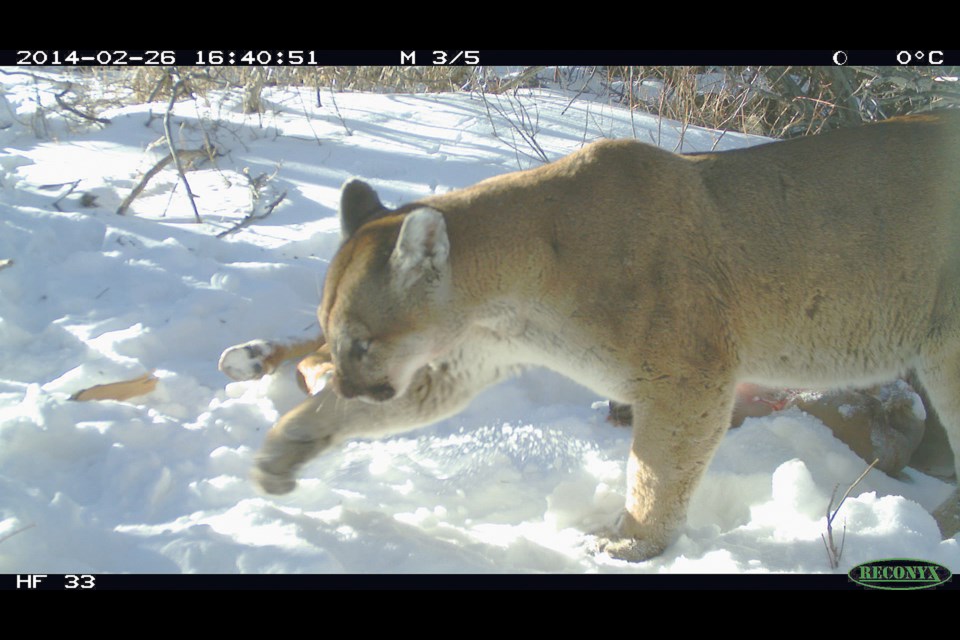BANFF – A person received non-critical injuries following a cougar attack in Banff National Park on Monday (Feb. 12).
Spokespeople with Parks Canada and Covenant Health confirmed a person had been injured in a cougar attack. The Covenant Health spokesperson said an ambulance with Banff EMS responded to the scene.
Alberta Health Services public education officer Stuart Brideaux said they arrived at Rockbound Lake trailhead at about 11 a.m.
“On arrival, our paramedics took care of one adult patient who had been in care of Parks Canada officials prior to their arrival,” Brideaux said, noting for privacy reasons they couldn’t release the gender or age of the person.
“In this case, fortunately, the patient sustained relatively minor soft tissue injuries in the incident and they were transported to the Canmore hospital in stable and calm condition.”
Following multiple requests for information from the Outlook and to speak to a wildlife expert from the Banff field unit, an unattributed statement from the Banff field unit more than 24 hours after the incident reiterated the area closure would be in place until further notice. They said they were continuing to "assess and investigate thing ongoing situation."
The area closure for the area of Castle Mountain Lookout and Silverton Falls, including Rockbound Lake, was made at about 5 p.m. Monday (Feb. 12).
"Parks Canada is asking park visitors to please avoid these areas, and respect closures in place to ensure the safety of the public and Parks Canada team members working in the area," said the area closure.
Nick de Ruyter, the WildSmart program director with the Biosphere Institute of the Bow Valley, said people should be prepared at all times when recreating outdoors.
He highlighted it was important for people to check for warnings and closures and if an area is closed or has a warning, to look at other options and “have a plan B or C and find somewhere else to go.”
De Ruyter added it was important to carry bear spray year-round, know how to use it, be sure to make noise, have any pets on leash and not to wear earbuds or headphones.
“By making noise you don’t surprise or sneak up on wildlife because you don’t know how they may react when they get surprised,” he said, adding it was important to look for wildlife tracks and scat as a sign if they may be around.
“People should have the mindset that anytime they’re heading out on the trails, they should expect an encounter so they’re mentally prepared and not surprised.”
Though seen in the region throughout the year, December to March can see high levels of cougar activity due to elk and deer seeking safe haven near populated areas.
Cougars can be encountered anywhere in the Kananaskis Country region and national parks such as Banff, Yoho and Kootenay.
“There’s no exact science, but typically every winter in January to March we do have reports of cougars,” de Ruyter said. “One piece is animals like deer and elk can be tired from the rut and there’s less food since there’s snow on the ground and they hang out closer to or inside towns and developed areas that can draw animals like a cougar into town.”
In 2001, Frances Frost was killed by a cougar in Banff National Park. She had been cross-country skiing near Lake Minnewanka and wildlife officials found the cougar near her body and immediately shot it.
Cougar sightings and warnings are frequent throughout the Bow Valley, but attacks are extremely rare. Since Frost’s death, there have been only a handful of cougar-related human deaths in North America.
A close encounter with a long-term Banff resident in 2021 led to Parks Canada putting down an eight-year-old female cougar due to her being “emaciated, dehydrated and in general poor health.” The cougar had entered the townsite and been seen near Muskrat and Wolf streets.
Last year, there were several close calls and area closures. In early 2023, a Calgary couple had a cougar follow them within 10 metres along the High Rockies Trail near Blackshale Creek suspension bridge in Peter Lougheed Provincial Park in Kananaskis Country.
A cougar also came within 20 metres of a hiker in the same area of Kananaskis Country last March. A cougar sighting at about the same time was in Canmore near Bow Meadows Crescent, while a cougar warning in January 2023 was up for Bow Valley Wildland Provincial Park around Cougar Creek, Horseshoe Loop trails and Montane Traverse Trail.
The Guy Lafleur Trail between the Stewart Creek area and Dead Man’s Flat’s was also the scene of a close encounter between a woman and her dog and a cougar who approached them in January 2023.
In summer 2023, a cougar warning was in place near Camp Chief Hector YMCA in Bow Valley Provincial Park due to several sightings and a fed-on deer carcass.
De Ruyter said in the last 100 years, there have been seven cougar-related deaths in Canada. Of those, five were children, one was a mother protecting her child and the other was Frost.
“They typically stay away from people. Their favourite food is deer and typically if a cougar attacks a person or even a pet is if they’re sick, starving, potentially old or trying to find dominance in a new area. … attacks on people are extremely rare.”
People are recommended to always carry bear spray, travel in groups, make noise while on the trail and keep pets on leash.
Parks Canada recommends if a person sees a cougar never approach them; face the cougar and slowly retreat; shout, wave a stick or throw rocks at the cougar to deter any attack; and try to look bigger by holding up your arms or an object above your head.
All cougar sightings or kill sites on provincial land should be reported to Kananaskis Emergency Services at 403-591-7755. In Banff National Park, people should contact 403-762-1470.




